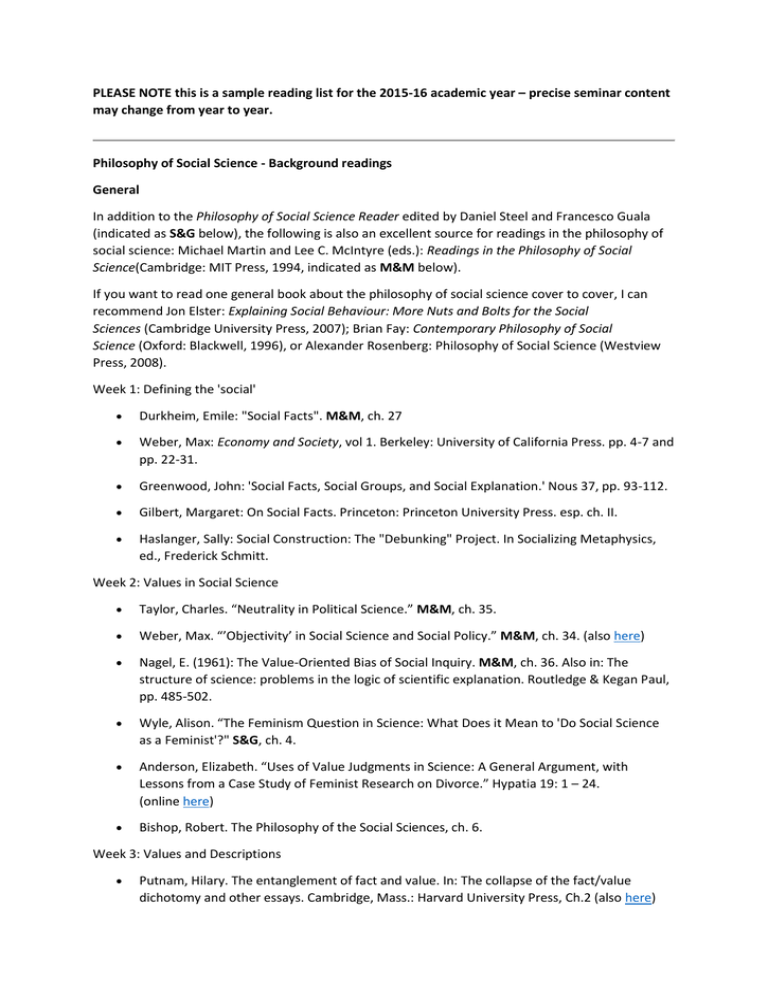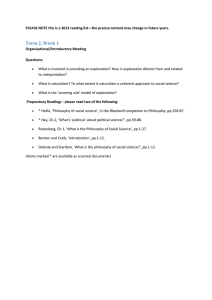PLEASE NOTE this is a sample reading list for the... may change from year to year.
advertisement

PLEASE NOTE this is a sample reading list for the 2015-16 academic year – precise seminar content may change from year to year. Philosophy of Social Science - Background readings General In addition to the Philosophy of Social Science Reader edited by Daniel Steel and Francesco Guala (indicated as S&G below), the following is also an excellent source for readings in the philosophy of social science: Michael Martin and Lee C. McIntyre (eds.): Readings in the Philosophy of Social Science(Cambridge: MIT Press, 1994, indicated as M&M below). If you want to read one general book about the philosophy of social science cover to cover, I can recommend Jon Elster: Explaining Social Behaviour: More Nuts and Bolts for the Social Sciences (Cambridge University Press, 2007); Brian Fay: Contemporary Philosophy of Social Science (Oxford: Blackwell, 1996), or Alexander Rosenberg: Philosophy of Social Science (Westview Press, 2008). Week 1: Defining the 'social' Durkheim, Emile: "Social Facts". M&M, ch. 27 Weber, Max: Economy and Society, vol 1. Berkeley: University of California Press. pp. 4-7 and pp. 22-31. Greenwood, John: 'Social Facts, Social Groups, and Social Explanation.' Nous 37, pp. 93-112. Gilbert, Margaret: On Social Facts. Princeton: Princeton University Press. esp. ch. II. Haslanger, Sally: Social Construction: The "Debunking" Project. In Socializing Metaphysics, ed., Frederick Schmitt. Week 2: Values in Social Science Taylor, Charles. “Neutrality in Political Science.” M&M, ch. 35. Weber, Max. “’Objectivity’ in Social Science and Social Policy.” M&M, ch. 34. (also here) Nagel, E. (1961): The Value-Oriented Bias of Social Inquiry. M&M, ch. 36. Also in: The structure of science: problems in the logic of scientific explanation. Routledge & Kegan Paul, pp. 485-502. Wyle, Alison. “The Feminism Question in Science: What Does it Mean to 'Do Social Science as a Feminist'?" S&G, ch. 4. Anderson, Elizabeth. “Uses of Value Judgments in Science: A General Argument, with Lessons from a Case Study of Feminist Research on Divorce.” Hypatia 19: 1 – 24. (online here) Bishop, Robert. The Philosophy of the Social Sciences, ch. 6. Week 3: Values and Descriptions Putnam, Hilary. The entanglement of fact and value. In: The collapse of the fact/value dichotomy and other essays. Cambridge, Mass.: Harvard University Press, Ch.2 (also here) Hacking, Ian. The Looping Effects of Human Kinds. S&G, ch. 2. (also here) Miranda Fricker: Powerlessness and Social Interpretation. S&G, chapter 3. (original here) Rosenberg, Alexander. Philosophy of Social Science. ch. 7. Anderson, Elizabeth. Values in Ethics and Economics. esp. ch. 5. Williams, Bernard. Ethics and the Limits of Philosophy. Week 4: Interpretation Taylor, Charles. “Interpretation and the Science of Man.” M&M ch. 13. Gordon, Robert 2009. Folk Psychology as Mental Simulation. Stanford Encyclopedia of Philosophy. online at http://plato.stanford.edu/entries/folkpsych-simulation/ Davidson, Donald. 1963. “Actions, Reasons, and Causes.” M&M ch. 43. Geertz, Clifford. 1994 [1973]. “Thick Descriptions: Towards an Interpretative Theory of Culture.” M&M ch. 14; S&G ch. 10. Kincaid, Harold. 1994 [1990]. “Defending Laws in the Social Sciences.” M&M ch. 8. Rosenberg, Alexander. Philosophy of Social Science. chs 2 and 4. Winch, Peter. 1995. The Idea of Social Science. 2nd edition. New York and London: Routledge, especially chapters 1 and 3. Week 5: Rational choice explanations Becker, Gary. 1996. “The Economic Way of Looking at Life.” In: Accounting for Tastes. Cambridge: Harvard University Press., pp. 139 – 161. (alsohere) Hollis, Martin and Robert Sugden. 1993. “Rationality in Action.” Mind 102: 1 – 35. Elster, Jon. 1985. “The Nature and Scope of Rational-Choice Explanation.” M&M ch. 20. (also here) Follesdal, Dagfinn. 1994. “The Status of Rationality Assumptions in Interpretation and in the Explanation of Action.” M&M ch. 19. (also here) Rosenberg, Alexander. Philosophy of Social Science. ch. 3. Week 7: The empirical challenge Tversky, Amos and Daniel Kahneman. 1981. “The Framing of Decisions and the Psychology of Choice.” Science 211(4481): 453 – 458. Fehr, Ernst and Klaus M. Schmidt. 1999. “A Theory of Fairness, Competition and Cooperation.” Quarterly Journal of Economics 114: 817 – 868. Gigerenzer, Gerd, Peter M. Todd, and the ABC Research Group. 1999. Simple Heuristics that Make Us Smart. Oxford: Oxford University Press, esp. chapter 1. (also here) Bishop, Robert C. The Philosophy of the Social Sciences. ch 10. Guala, Francesco. 2006.”Has Game Theory Been Refuted?” Journal of Philosophy 103: 239 – 63. Kahneman, Daniel and Amos Tversky. 2000. Choices, Values, and Frames. Cambridge: Cambridge University Press. Sen, Amartya. 1977. "Rational Fools: A Critique of the Behavioural Foundations of Economic Theory." Philosophy and Public Affairs 6: 317 – 344 (available through Jstor). Simon, Herbert. 1955. “A Behavioral Model of Rational Choice.“ Quarterly Journal of Economics 59: 99 – 118. Week 8: Defending Rational Choice Models Woodward, Jim. 2009. “Experimental Investigations of Social Preferences.” In Kincaid, H. and D. Ross (eds.) Oxford Handbook of the Philosophy of Economics. Oxford: Oxford University Press, pp. 189 – 222. (also here) Hausman, Daniel. 2005. "Sympathy, Commitment, and Preference" Economics and Philosophy 21: 33-50. Pettit, Philip. 2005. "Construing Sen on Commitment" Economics and Philosophy 21, 15-32. Camerer, Colin F. and Ernst Fehr. 2006. “When Does „Economic Man‟ Dominate Social Behavior?” Science 311: 47 – 52. Elster, Jon. 1989. The Cement of Society. Cambridge: Cambridge University Press. Searle, John R. 2001. “The Classical Model of Rationality and its Weaknesses.” In Rationality in Action. Cambridge: MIT Press, pp. 1 – 32. Week 9: Conventions and Institutions Lewis, David: "Coordination and Convention." S&G ch. 21. Searle, John: "What is an Institution?" S&G ch. 23. Rescorla, Michael: "Convention." Stanford Encyclopedia of Philosophy (online) Sugden, Robert. 2000. “Team Preferences.” Economics and Philosophy 16: 175 – 204. Anderson, Elizabeth. 2000. “Beyond Homo Economicus: New Developments in Theories of Social Norms.” Philosophy and Public Affairs 29: 170 – 200. Searle, John R. 1995. The Construction of Social Reality. New York: Free Press, esp. part I. Cubitt, R and Robert Sugden. 2003. “Common Knowledge, Salience, and Convention: A Reconstruction of David Lewis’ Game Theory.” Economics and Philosophy 19: 175 – 210. Lewis, David. 2002 [1969]. Convention. Oxford: Blackwell. Week 10: Collective agency Roth, Abraham Sesshu. 2011. Shared Agency. The Stanford Encyclopedia of Philosophy (Spring 2011 Edition), online Toleffsen, D. 2004. Collective intentionality. Internet Encyclopedia of Philosophy, online Pacherie, E. 2003. Is collective intentionality really primitive? American Journal of Economics and Sociology, 62(1). Anderson, Elizabeth. 2001. “Unstrapping the Straitjacket of 'Preference': on Amartya Sen's Contributions to Philosophy and Economics.” Economics and Philosophy 17: 21 – 38. Searle, J. 1990. Collective intentions and actions. In P. R. Cohen, J. Morgan, & M. E. Pollack (eds), Intentions in Communication. Cambridge, Mass.: MIT Press. (also on Searle's webpage) Bratman, Michael. 1993. “Shared Intention.” Ethics 104: 97 – 113. Gilbert, Margaret. 1992. On Social Facts. Princeton: Princeton University Press, esp. chapters 4 and 7. Tuomela, Raimo. 1995. The Importance of Us. Stanford: Stanford University Press.



